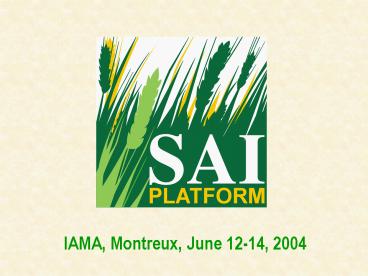April 6, 2004 Presentation 1 PowerPoint PPT Presentation
1 / 15
Title: April 6, 2004 Presentation 1
1
IAMA, Montreux, June 12-14, 2004
2
Why SAI Platform?
The Food Industry has great interest in
sustainable agriculture
- The Food Industry relies on the long-term supply
of agricultural raw materials in quality and
quantity
- The state of natural resources and rural
societies affects agricultural production (both
in positive negative terms)
- Consumers confidence depends on the quality
safety of the food supply chain
- Society develops growing requirements for
sustainability
3
What is Sustainable Agriculture?
Sustainable agriculture (SA) is a productive,
competitive and efficient way to produce
agricultural raw materials, while at the same
time protecting and improving the natural
environment as well as the socio-economic
conditions of local communities
4
SAI Platforms approach
A Food Industry initiative aiming to actively
- Support the development of SA practices through
crop-specific working groups
- Communicate worldwide about SA
Working together with growers, other food chain
stakeholders and other interested parties (next
slide)
Including all valuable concepts and initiatives
contributing to SA
5
SAI Platforms environment
S U P P L Y C H A I N
CONSUMERS
RETAILERS
FARMERS
FOOD companies
TRADING companies
Trade Policy- makers
Input providers
Research Academic
Advisory Services
Financial Institutions
NGOs
IGOs
Media
OTHER STAKEHOLDERS
6
SAI Platforms Members
Campina Danisco Dole Ecom Efico Findus Fonterra Fr
iesland Coberco Groupe Danone
Kraft McCain Europe McDonalds Nestlé Neumann
Kaffee Gruppe Sara Lee Tchibo Unilever VOLCAFE
7
Working Groups Common Framework
- 1) Definition of each Working Groups Methodology
- Launch by Members of WG focusing on specific
crop(s) - Meetings to define approach methodology to
develop practices - ? Guidelines related documents (indicators etc)
drafted
- 2) Stakeholder consultation Test through pilot
projects - Test through pilot projects
- Review on basis of pilots results
stakeholders feedback - ? Working Groups first set of Practices finalised
3) Roll-out under the responsibility of companies
8
Key issues in Working Groups Practices - Example
of dairy
- Economic Pillar
- Adequate animal lodging and feeding
- Hygienic conditions of milking and milk storage
- Transparency and traceability in the supply chain
- Environmental Pillar
- Soil, water, biodiversity, air and energy
conservation - Integrated crop protection
- Adequate effluent, organic matter and waste
management
- Social Pillar
- Minimum labour conditions based on ILO
conventions - Adequate worker health and safety measures
- Contribution to the local economy and rural
development
9
Working groups achievements (1)
Working Group on Cereals Chair Groupe
Danone. Other membersMcDonalds, Nestlé.
- European scope at first, to become global later
on - Practices drafted through stakeholder
consultations being reviewed by the Executive
Committee before publication - Next steps development of indicators testing
through pilots
10
Working groups achievements (2)
Working Group on Coffee Chair Neumann Kaffee
Gruppe. Other members Ecom, Efico, Kraft,
Nestlé, SaraLee, Tchibo, Volcafé.
- Mission statement and draft principles
practices finalized - Practices indicators being tested through 12
pilot projects - Collaboration with 4Cs SCI intergovernmental
processes - Next review of pilot projects results with key
stakeholders at workshop, to be held in Latin
America in November 2004
11
Working groups achievements (3)
Working group on dairy Chair Friesland
Coberco. Other members Campina, Fonterra, Groupe
Danone, Kraft, Nestlé, Unilever.
- Mission statement finalised
- Draft principles practices being revised
- Next step stakeholder consultation
12
Working groups achievements (4)
Working Group on Potatoes Vegetables Chair
McCain. Other members Findus, Kraft, McDonalds,
Nestlé, Unilever.
- Focusing on several (arable) crops lt-gt overall
farm approach - Consultation meeting held at early stage with key
grower representatives from Europe Northern
America - Mission Statement drafted, further documents to
be developed
13
Work on Palm Oil
Roundtable on Palm Oil Board President Unilever,
Vice-Pdt WWF, Treasurer Migros Other Members
MPOA, Golden Hope, IOI, Aarhus, Karlshamns, Body
Shop, Oxfam, Sawit Watch
- First Roundtable held in KL, August 2003 over
200 participants - Association established under Swiss Law, March
2004. - Statement of Intent agreed
- Next steps Secure payed fee by at least 50
stakeholders, hold Second Roundtable, prepare for
First General Assembly and agree on Workplan
14
Key Activities Challenges for 2004
- Development of SA practices
- Further development of SA practices by the
Working Groups - Test of these practices and development of
indicators of progress - Share information between Working Groups other
initiatives
- Expansion of SAI Platform recognition and
membership - Update current communication material with
outputs of the Working Groups - Increase communication to key stakeholders on SAI
Platform approach - Set up Advisory Council representing the
different stakeholder groups - Increase global food industry participation
- Develop close working relationship with CIAA
15
- Contacts
- SAI Platform Secretariat in Brussels
- Avenue des Arts 43, Brussels 1040, Belgium
- Tel 32 (0)2 549 56 40 / Fax 32 (0)2 508 10 21
- E-mail info_at_saiplatform.org
- Website http//www.saiplatform.org

